Are you ready to transform your garden into a stunning oasis? With my garden specialists tips, you’ll have all the knowledge you need to create your dream outdoor space.
Dr. Chloë Duckworth, an archaeologist and presenter on The Great British Dig, offers tips on conducting your own garden dig to uncover lost history. Her book provides practical know-how for marking out a mini trench, identifying finds, and caring for them. She emphasizes that the UK is an ideal place for garden digs due to its rich history and abundance of gardeners.
Duckworth suggests using online map resources to research the historical development of your village or area. She also advises looking for clues in the garden, such as areas of grass that dry out faster or uneven ground indicating the presence of solid features like walls. Duckworth’s book includes guides for dating and identifying common finds like glass, ceramics, and clay pipes.
While most finds in gardens are everyday objects discarded in the past, the experience of digging and unearthing artifacts provides a tangible connection with history. Duckworth encourages people to try garden digging as a therapeutic and rewarding activity that combines outdoor exercise and historical exploration.
- Dr. Chloë Duckworth’s book offers practical tips for conducting garden digs to uncover lost history.
- Researching the historical development of your village or area using online maps can provide valuable insights for your garden dig.
- Look for clues in your garden, such as areas of grass that dry out faster or uneven ground, to identify potential solid features like walls.
- Duckworth’s book includes guides for dating and identifying common finds like glass, ceramics, and clay pipes.
- Garden digging is a therapeutic and rewarding activity that combines outdoor exercise and historical exploration.
Expert Gardening Advice for a Lush Garden
Achieving a lush garden requires expert gardening advice. Discover essential tips and techniques to ensure your plants thrive year-round. As a professional gardener with years of experience, I have learned valuable insights that I am excited to share with you.
One of the most important aspects of maintaining a lush garden is proper soil preparation. Start by testing the pH level of your soil to determine its acidity or alkalinity. This will help you choose the right plants and ensure they receive the necessary nutrients. Consider adding organic matter, such as compost or well-rotted manure, to improve soil structure and fertility. Regularly aerating the soil and removing weeds will also promote healthy growth.
Watering techniques are another crucial factor in maintaining a lush garden. It’s important to water deeply and infrequently, allowing the water to penetrate the root zone. Consider using a drip irrigation system or soaker hoses to deliver water directly to the plants’ roots, minimizing water waste. Mulching around your plants can help retain moisture and suppress weed growth.
| Soil Preparation Tips | Watering Techniques |
|---|---|
| Test soil pH | Water deeply and infrequently |
| Add organic matter | Use drip irrigation or soaker hoses |
| Aerate soil regularly | Mulch around plants |
| Remove weeds |
Additionally, proper plant care is essential for a lush garden. Regular pruning and deadheading will promote healthy growth and encourage the production of vibrant blooms. Fertilizing your plants with a balanced and slow-release fertilizer will provide the necessary nutrients for optimal growth. It’s also important to monitor for pests and diseases, addressing any issues promptly to prevent them from spreading.
By following these expert gardening tips, you can create a garden that is not only lush but also a source of pride and enjoyment. Remember to tailor your gardening practices to the specific needs of your plants and be patient, as it takes time for a garden to reach its full potential.
Expert Gardening Tips Summary:
- Test soil pH and add organic matter for optimal soil preparation.
- Water deeply and infrequently, using drip irrigation or soaker hoses to minimize water waste.
- Aerate soil regularly, remove weeds, and mulch around plants to promote healthy growth.
- Prune, deadhead, and fertilize plants to ensure vibrant blooms and balanced growth.
- Monitor for pests and diseases, taking prompt action to prevent further damage.
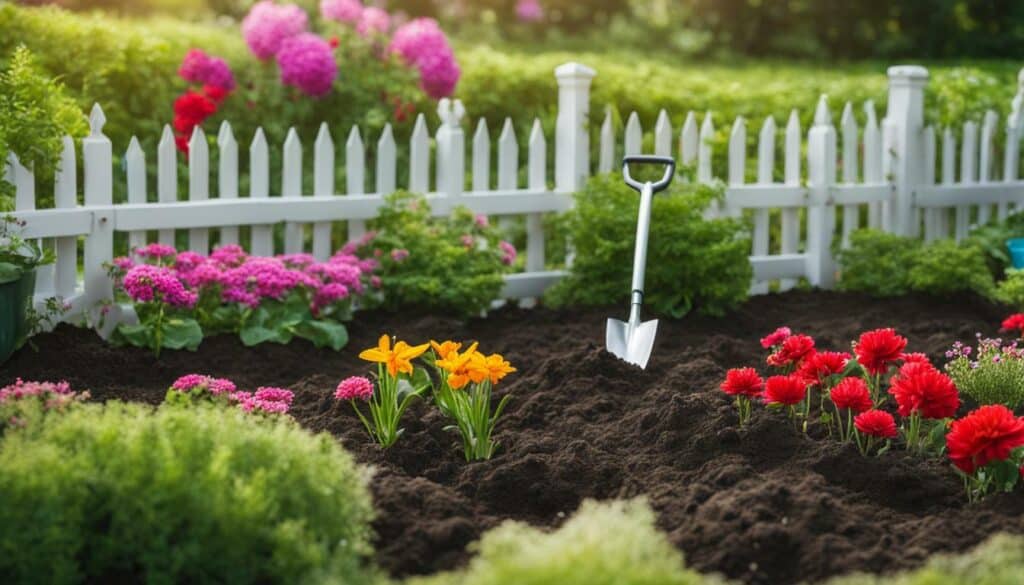
With these expert gardening tips, you are well on your way to creating a lush garden that will be the envy of your neighbors. Stay tuned for more valuable advice in the upcoming sections to further enhance your gardening skills and make the most of your outdoor space.
Creating a Sustainable Garden with Effective Tips
Take your gardening skills to the next level with advanced tips for creating a sustainable and environmentally friendly garden. As garden specialists, we understand the importance of preserving the natural resources of our planet while enjoying the beauty of our outdoor spaces. In this section, I will share some effective tips to help you create a garden that is both stunning and sustainable.
One of the key aspects of a sustainable garden is soil health. By enriching your soil with organic matter, you can improve its structure and fertility. Consider using compost made from kitchen scraps and garden waste to feed your soil and promote healthy plant growth. Additionally, practicing crop rotation and companion planting can help reduce the need for chemical fertilizers and pesticides.

Water conservation is another critical factor in sustainable gardening. Opt for drip irrigation or a soaker hose system to water your plants efficiently and minimize water waste. Mulching your garden beds can also help retain moisture in the soil, reducing the need for frequent watering.
When it comes to pest control, it’s essential to opt for natural and environmentally friendly methods. Use companion planting to deter pests, such as planting marigolds to repel aphids or basil to keep mosquitoes away. You can also introduce beneficial insects like ladybugs and lacewings that prey on garden pests.
Table: Sustainable Gardening Tips
| Tip | Description |
|---|---|
| Compost | Enrich your soil with homemade compost for improved fertility. |
| Crop Rotation | Rotate your crops to prevent nutrient depletion and reduce the risk of pests and diseases. |
| Drip Irrigation | Use a drip irrigation system to water plants directly at their roots, minimizing water waste. |
| Mulching | Apply a layer of organic mulch to retain moisture in the soil and suppress weed growth. |
| Companion Planting | Plant compatible crops together to naturally repel pests and attract beneficial insects. |
By implementing these advanced gardening tips, you can create a sustainable garden that not only enhances the beauty of your outdoor space but also contributes to the well-being of our planet. Embrace the principles of organic gardening, conserve water, and prioritize natural pest control methods. Together, we can make a difference in preserving the environment while enjoying the pleasures of gardening.
Designing Your Dream Garden: Tips from the Professionals
Designing your dream garden is within reach with these expert tips from garden specialists. Creating a beautiful and functional outdoor space requires careful planning and attention to detail. Whether you have a large backyard or a small urban garden, these tips will help you make the most of your space and create a garden that reflects your personal style.
1. Start with a plan: Before you begin planting and landscaping, take the time to create a detailed plan for your garden. Consider factors such as the amount of sunlight, soil type, and drainage in different areas of your garden. This will help you choose the right plants and ensure that everything thrives in its designated spot.
2. Choose the right plants: Selecting the right plants is crucial for a successful garden. Consider the climate of your area and choose plants that are suited to your specific conditions. Pay attention to the mature size of plants to ensure they fit well in your space. Think about color schemes and textures to create a visually appealing garden that blooms throughout the seasons.
3. Incorporate hardscaping elements: Hardscaping elements, such as pathways, patios, and pergolas, can add structure and functionality to your garden. Consider using natural materials like stone or wood for a timeless and organic look. These elements can also provide seating areas or outdoor entertaining spaces for you to enjoy with friends and family.

4. Pay attention to details: The details are what make a garden truly special. Consider adding decorative elements like statues, water features, or colorful planters to add visual interest and create focal points. Don’t forget to include lighting to extend the enjoyment of your garden into the evening hours.
Maintaining a Beautiful Garden Throughout the Year
A well-designed garden requires ongoing care and maintenance to keep it looking its best. Here are a few additional tips to help you maintain your dream garden:
- Water regularly and deeply, especially during dry spells.
- Prune and trim plants to promote healthy growth and maintain their shape.
- Remove weeds regularly to prevent them from competing with your plants for nutrients.
- Fertilize plants as needed to ensure they receive the necessary nutrients.
- Monitor for pests and diseases and take appropriate action to protect your plants.
By following these expert tips, you can create a stunning garden that brings you joy and relaxation throughout the year. Happy gardening!
Enhancing Curb Appeal: Garden Care Tips for a Welcoming Entrance
Boost your home’s curb appeal with these essential garden care tips that will make your entrance a welcoming sight. A well-maintained garden not only adds beauty to your home but also creates a warm and inviting atmosphere for guests. Whether you have a sprawling front yard or a small balcony, these advanced gardening tips will help you create an impressive entrance that reflects your personal style.

An effective way to enhance your entrance is by incorporating vibrant colors through flowers and plants. Consider planting annuals and perennials that bloom in different seasons to ensure year-round color. Opt for a mix of low-maintenance plants that are suitable for your region’s climate and can withstand varying weather conditions. This way, your garden will always look inviting, no matter the time of year.
Strategic Lighting
Outdoor lighting can greatly enhance the beauty of your entrance. Install landscape lights along pathways or use uplighting to highlight architectural features and trees. This not only adds a welcoming glow during evening hours but also increases security and safety. Choose energy-efficient LED lights and consider adding timers or motion sensors for convenience and cost-effectiveness.
Well-Defined Borders and Pathways
A well-defined garden with clearly marked borders and pathways creates a sense of structure and organization. Use decorative stones, bricks, or plants to edge your garden beds and pathways. This not only adds visual appeal but also prevents grass and weeds from encroaching onto your flower beds. Additionally, consider adding stepping stones or a paved walkway to guide visitors to your entrance.
By implementing these garden care tips, you can transform your entrance into a beautiful and welcoming space. Remember to regularly maintain your garden by watering, weeding, and pruning as needed. With a little effort and creativity, your entrance will become an inviting haven that leaves a lasting impression on anyone who visits your home.
Maximizing Small Spaces: Expert Tips for Urban Gardens
Don’t let limited garden space hold you back! Discover expert tips for creating an urban oasis in even the smallest of areas. With a little creativity and strategic planning, you can transform your tiny outdoor space into a thriving garden.
One effective way to maximize small spaces is through vertical gardening. By using walls, fences, or trellises, you can grow climbing plants like ivy, roses, or jasmine, adding height and visual interest to your garden. Hanging baskets are another great option for adding greenery without taking up precious ground space. Consider using trailing plants like petunias or cascading ferns to create a lush and vibrant display.
Container gardening is also a fantastic solution for urban gardens. Whether you have a balcony, patio, or just a small corner, containers allow you to grow a variety of plants in a confined space. Opt for compact varieties of vegetables, such as cherry tomatoes or peppers, or try growing herbs like basil, mint, or rosemary.
| Expert Tips for Maximizing Small Spaces: |
|---|
| 1. Choose plants that are well-suited for small spaces, such as dwarf or compact varieties. |
| 2. Utilize vertical gardening techniques to make the most of limited space. |
| 3. Implement container gardening to grow a variety of plants in small areas. |
| 4. Opt for hanging baskets to add visual interest without taking up ground space. |
| 5. Create designated zones within your garden, such as seating areas or herb gardens, to maximize functionality. |
Lastly, creating designated zones within your garden can help optimize functionality. Define specific areas for seating, entertaining, or even a small herb garden. This not only creates visual interest but also makes your small space more efficient and enjoyable.

With these expert tips for maximizing small spaces, you can turn your urban garden into a flourishing oasis. Embrace the challenge of limited space and let your creativity thrive. Whether it’s through vertical gardening, container gardening, or thoughtful zoning, you can create a beautiful and functional outdoor space that brings joy and tranquility to your urban lifestyle.
Seasonal Gardening: Insider Tips for Year-Round Success
Master the art of seasonal gardening with these insider tips from experienced garden specialists. Whether you’re new to gardening or a seasoned pro, understanding the specific needs of each season is essential for achieving a thriving garden throughout the year.
When it comes to spring gardening, focus on preparing your soil for new growth. Remove any winter debris, loosen the soil with a fork, and add compost or organic matter to enrich the soil. This will provide the necessary nutrients for healthy plant development. Additionally, start sowing seeds indoors and gradually harden them off before transplanting them outdoors.
In the summer months, proper watering techniques are crucial. Water deeply and less frequently to encourage deep root growth and prevent water runoff. Mulching around your plants will help retain moisture and suppress weeds. Regularly deadhead spent flowers to promote continuous blooming, and keep an eye out for pests and diseases, taking proactive measures to prevent and treat them.
As the cooler temperatures of autumn arrive, focus on harvesting and preserving your crops. Clean up any plant debris to prevent the spread of diseases and pests. Remove annuals that have finished blooming and replace them with cool-season plants. Prepare your garden for winter by applying a layer of mulch to protect plants from frost and insulate the soil.

Winter gardening may seem challenging, but there are still tasks to be done. Protect your plants from frost by covering them with blankets or plant covers. Consider growing cold-hardy winter vegetables such as kale, carrots, and Brussels sprouts. Take advantage of the downtime by planning for the upcoming seasons, browsing seed catalogs, and designing your dream garden.
Troubleshooting Common Garden Problems: Expert Solutions
Don’t let garden problems dampen your spirits! Get expert solutions to common issues and keep your garden thriving. As an experienced gardener, I have encountered and conquered many challenges in my own garden. In this section, I will share some of the most common garden problems and provide expert advice on how to solve them.
“A beautiful garden requires commitment and hard work, but with the right knowledge, you can overcome any obstacle.”
One of the most common issues gardeners face is pest infestations. Whether it’s aphids on your roses or slugs devouring your lettuce, these unwelcome guests can wreak havoc on your plants. To combat pests, I recommend taking a proactive approach. Implement organic pest control methods such as companion planting, which involves growing insect-repellent plants alongside your vulnerable crops. Additionally, regular inspection and manual removal of pests can help keep their populations in check.
Another common problem is nutrient deficiencies in plants. If you notice yellowing leaves or stunted growth, it may be a sign that your plants are not receiving the necessary nutrients. Conduct a soil test to identify any deficiencies and amend the soil accordingly. Organic fertilizers, compost, and natural amendments like bone meal or seaweed extract can help replenish the nutrients in your garden.
Lastly, plant diseases can be a major setback for gardeners. Fungal infections, powdery mildew, and blight are some common diseases that can affect a wide range of plants. To prevent the spread of diseases, practice good garden hygiene by removing and disposing of infected plant material. Proper spacing and adequate ventilation can also help reduce the risk of disease. In cases where diseases have already taken hold, organic treatments like neem oil or copper fungicides can help control and minimize the damage.
| Garden Problem | Expert Solution |
|---|---|
| Pest infestations | Implement organic pest control methods, such as companion planting and manual removal of pests. |
| Nutrient deficiencies | Conduct a soil test and amend the soil with organic fertilizers and natural amendments. |
| Plant diseases | Practice good garden hygiene, such as removing infected plant material, and use organic treatments when necessary. |

By addressing these common garden problems with expert solutions, you can ensure that your garden remains healthy and vibrant throughout the seasons. Remember, a beautiful garden requires commitment and hard work, but with the right knowledge, you can overcome any obstacle.
The Art of Garden Maintenance: Tips for Keeping Your Garden Beautiful
Discover the secrets to maintaining a beautiful garden with these tips from seasoned garden specialists. Effective garden care is essential for ensuring that your outdoor space remains vibrant and inviting all year round. By following these expert tips, you can create a garden that will be the envy of your neighborhood.
First and foremost, regular watering is crucial for the health and vitality of your plants. Be sure to water deeply, allowing the water to penetrate the soil and reach the roots. This will encourage strong root growth and help your plants withstand periods of drought. Additionally, consider installing a drip irrigation system for more efficient and targeted watering.
Another important aspect of garden maintenance is proper pruning. Regular pruning helps control the size and shape of your plants, promotes better air circulation, and encourages the growth of new, healthy branches. Remember to use sharp, clean tools and prune during the appropriate season for each specific plant. Consult a gardening guide or seek advice from a professional if you are unsure.
Lastly, don’t forget to nourish your garden with the right nutrients. Use organic fertilizers to provide essential minerals and promote healthy growth. Mulching is also beneficial, as it helps retain moisture, suppresses weeds, and improves soil fertility. Just be sure to choose a mulch that is suitable for your specific plants and climate.
| Garden Maintenance Tips | Benefits |
|---|---|
| Regular watering | Ensures plant health and vitality |
| Proper pruning | Controls plant size and shape, promotes air circulation |
| Applying organic fertilizers | Nourishes plants and improves soil fertility |
| Mulching | Retains moisture, suppresses weeds, and enhances soil fertility |
By incorporating these tips into your garden care routine, you can ensure that your outdoor space remains a vibrant and beautiful haven. Remember, gardening is both an art and a science, and a little bit of care and attention can go a long way in creating a stunning garden.

Unlocking the Potential of Your Garden: Expert Landscaping Tips
Turn your garden into a masterpiece with expert landscaping tips that will help you unlock its full potential. With the right design principles, plant selection, and hardscape options, you can create a stunning outdoor space that reflects your personal style and maximizes the beauty of nature.
Start by assessing the layout and size of your garden. Consider the available space and how it can be optimized to create different areas for relaxation, entertainment, and gardening. Divide your garden into zones and use pathways or hedges to create visual separation.
To add depth and interest, incorporate a mix of plants with varying heights, colors, and textures. Choose flowers and foliage that bloom during different seasons to ensure year-round beauty. Consider incorporating native plants that are well-suited to your region and require less maintenance.
Add focal points and architectural elements to enhance the overall design. This can include features like a water fountain, a pergola, or a decorative sculpture. These elements create visual interest and serve as conversation starters.

To add a touch of elegance and functionality, consider incorporating outdoor lighting. This will not only illuminate your garden at night but also create a warm and inviting ambiance. Use a combination of pathway lights, uplights on trees and architectural features, and string lights for a magical effect.
Remember to maintain your garden regularly to keep it looking its best. This includes pruning plants, removing weeds, and keeping the lawn well-trimmed. Consider using organic fertilizers and pest control methods to minimize environmental impact.
By implementing these expert landscaping tips, you can transform your garden into a captivating oasis that brings joy and relaxation. Whether you have a small urban plot or a sprawling backyard, unlocking the potential of your garden will provide endless opportunities for enjoyment and beauty.
Growing Your Own Food: Tips for a Productive Edible Garden
Enjoy the satisfaction of growing your own food with these expert tips for creating a productive edible garden. Not only does it provide a source of fresh and nutritious produce, but it also allows you to connect with nature and take control of what you eat. Whether you have a spacious backyard or a small balcony, there are ways to maximize your gardening efforts and enjoy a bountiful harvest.
To start, choose the right location for your edible garden. Most plants require at least six hours of direct sunlight, so select a spot that receives ample sunlight throughout the day. If you have limited space, consider vertical gardening using trellises or hanging baskets to maximize growing areas. Good soil is essential for plant growth, so enrich it with organic matter like compost or well-rotted manure. This will provide the necessary nutrients for your plants to thrive.
When it comes to choosing what to grow, consider your family’s preferences and the available space. Popular choices for beginners include salad greens, herbs, tomatoes, and peppers. These can be easily grown in pots or raised beds. Research the specific growing requirements of each plant, including watering needs, spacing, and pest control. Additionally, practice crop rotation to avoid depleting the soil of essential nutrients and minimize pest and disease problems.
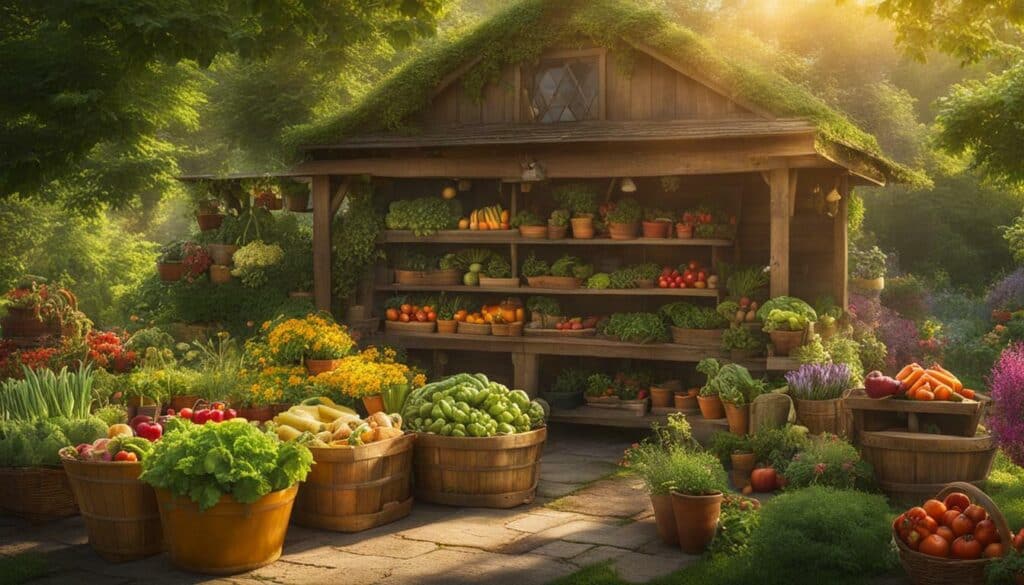
Here are some additional tips to ensure a productive edible garden:
- Water regularly, keeping the soil consistently moist but not waterlogged.
- Use mulch to retain moisture, suppress weeds, and regulate soil temperature.
- Control pests organically by using natural methods like companion planting or introducing beneficial insects.
- Harvest crops when they are ripe to encourage continuous production.
- Preserve excess produce through canning, freezing, or drying for future use.
“Growing your own food not only offers a sense of accomplishment but also provides a tangible connection with nature. It’s a rewarding journey that allows you to savor the flavors of homegrown goodness,” says Dr. Chloë Duckworth.
By following these expert tips and putting in a little effort, you can reap the rewards of a productive edible garden. There’s nothing quite like the taste of freshly harvested fruits and vegetables that you’ve nurtured from seed to plate. So, roll up your sleeves, get your hands dirty, and enjoy the journey of growing your own food.
Your Dream Garden Awaits: Start Implementing These Specialist Tips Today!
Don’t wait any longer to create your dream garden – start implementing these specialist tips today and watch your outdoor space flourish! As an expert in garden specialists tips, I’ve gathered a wealth of knowledge and practical advice to help you transform your garden into a beautiful and vibrant retreat. Whether you’re a seasoned gardener or just starting out, these effective garden specialist tips will guide you every step of the way.
One essential tip is to conduct your own garden dig to uncover lost history and add a touch of intrigue to your outdoor space. Dr. Chloë Duckworth, an archaeologist and presenter on The Great British Dig, has shared her expertise on how to mark out a mini trench, identify historical finds, and care for them. With her guidance, you can explore the rich history that lies beneath your feet and create a truly unique garden.
To enhance the beauty of your garden, consider researching the historical development of your village or area using online map resources. This will provide valuable insights into the past and help you design a garden that reflects the heritage of your surroundings. Look for clues in your own garden, such as areas of grass that dry out faster or uneven ground, as these can indicate the presence of hidden features like walls.
As you embark on your gardening journey, Dr. Duckworth’s book offers invaluable advice on dating and identifying common finds, such as glass, ceramics, and clay pipes. While not every discovery will be a rare artifact, the thrill of unearthing these pieces creates a tangible connection with history. Garden digging is not only a therapeutic and rewarding activity but also an opportunity to combine outdoor exercise with historical exploration.
So, what are you waiting for? Start implementing these specialist tips today and embark on your journey to create the garden of your dreams. With these expert gardening tips and a little bit of hard work, your outdoor space will flourish and become a treasure trove of beauty and history. Unearth the potential of your garden and watch it transform into a captivating oasis you’ll be proud to call your own.
FAQ on Garden Specialists Tips
Q: How can I research the historical development of my village or area?
A: You can use online map resources to research the historical development of your village or area. These resources provide valuable information that can help you uncover lost history in your garden.
Q: What are some clues to look for in my garden to indicate the presence of solid features?
A: Areas of grass that dry out faster or uneven ground are clues that indicate the presence of solid features like walls. Keep an eye out for these signs while conducting your garden dig.
Q: What common finds can I expect to uncover in my garden?
A: Most finds in gardens are everyday objects discarded in the past. You may come across items such as glass, ceramics, and clay pipes. These artifacts provide a tangible connection with history.
Q: Is garden digging a therapeutic activity?
A: Yes, garden digging can be a therapeutic and rewarding activity. It combines outdoor exercise with historical exploration, allowing you to unwind while uncovering hidden treasures in your own backyard.

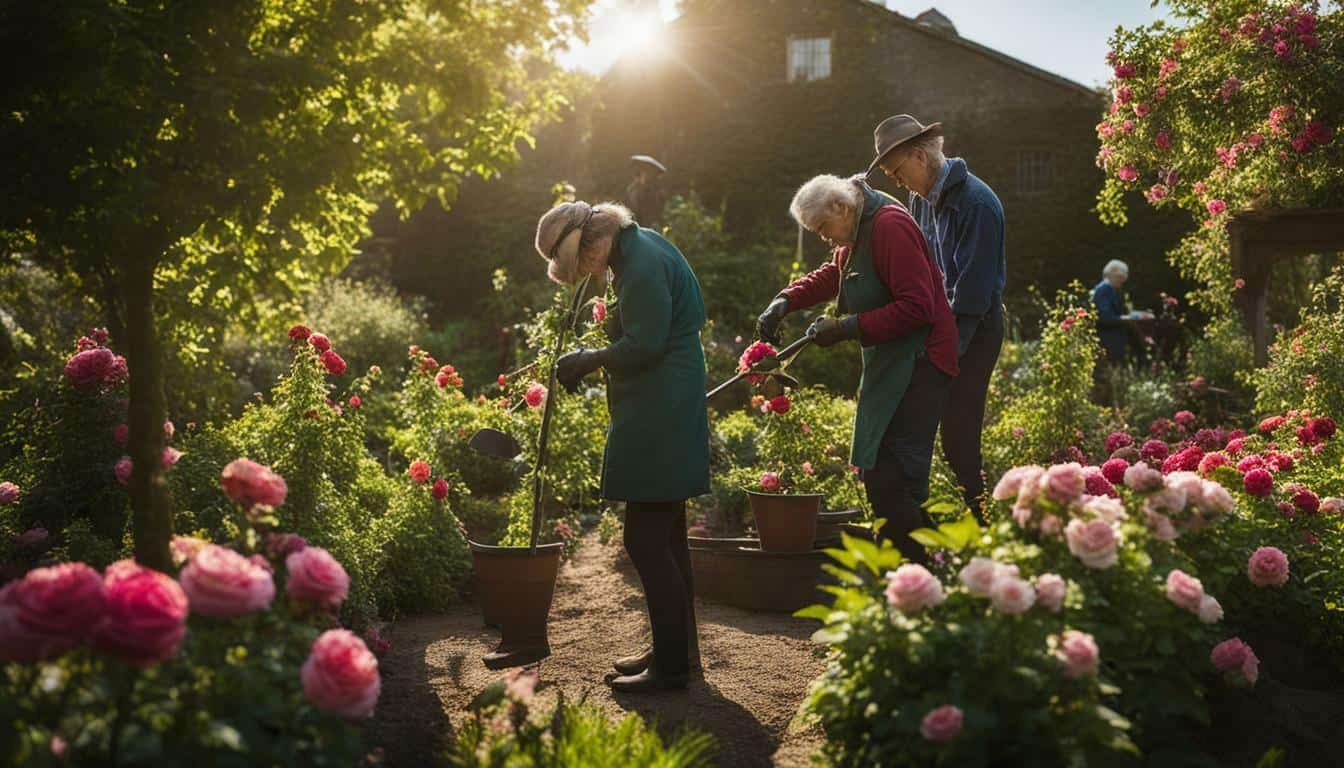
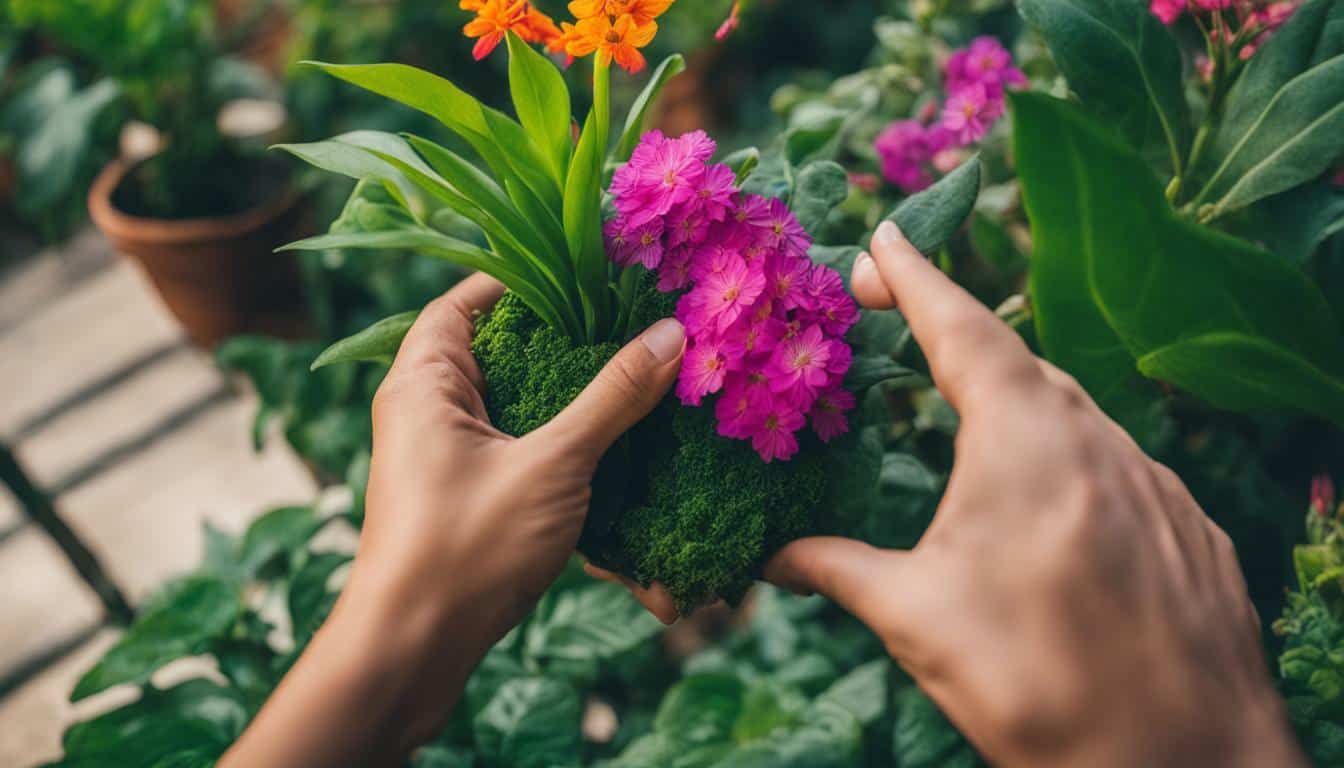
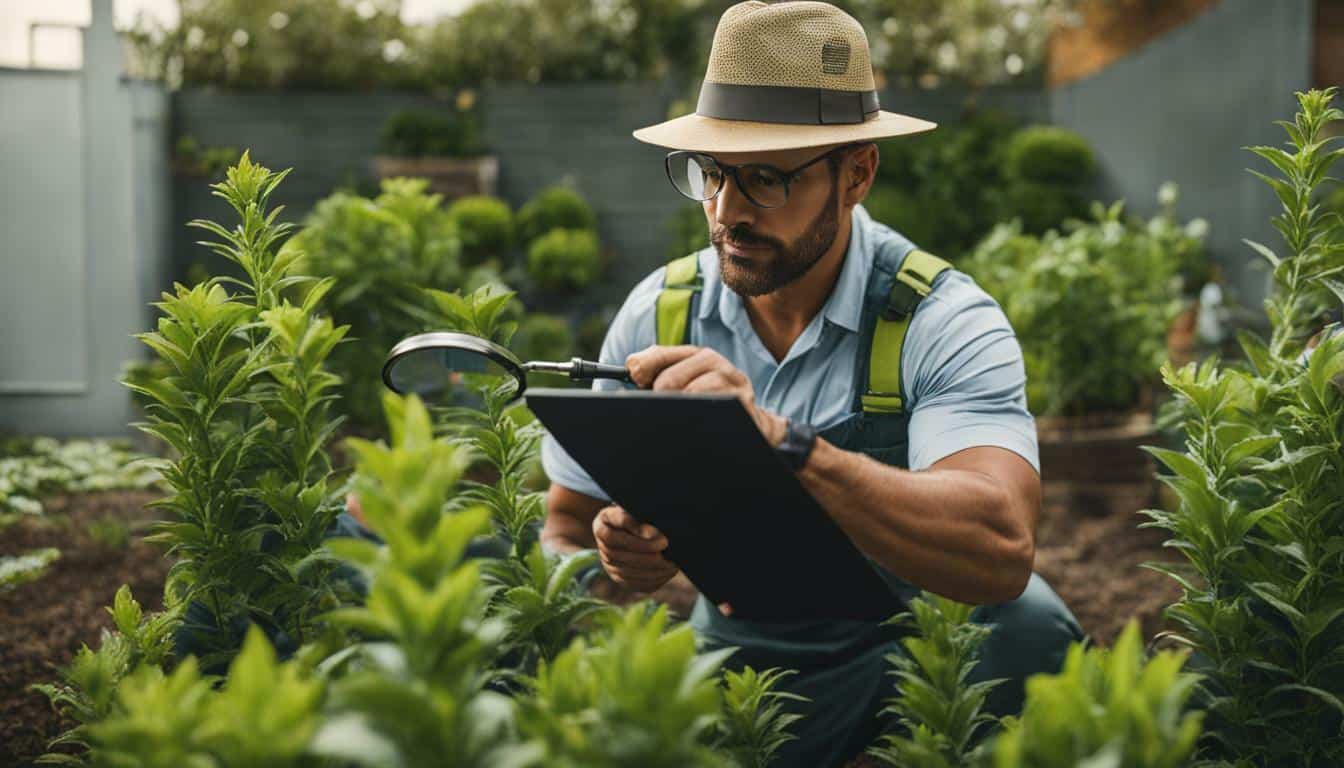

Leave a Reply